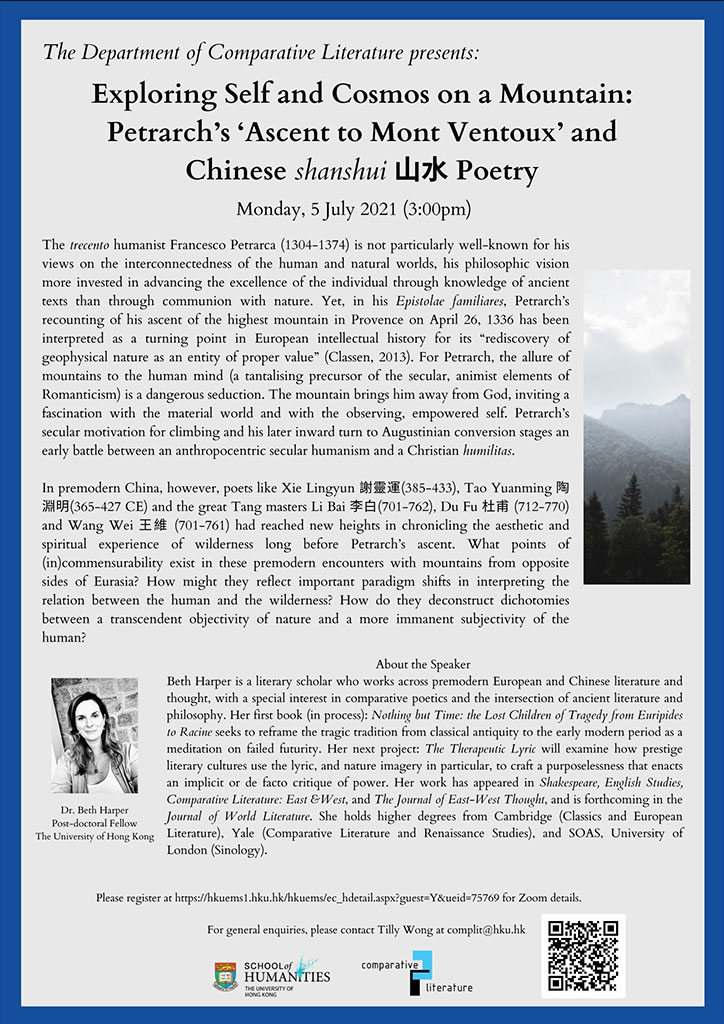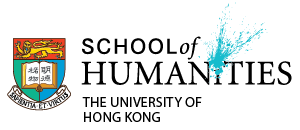
Department of Comparative Literature
Exploring Self and Cosmos on a Mountain: Petrarch’s ‘Ascent to Mont Ventoux’ and Chinese shanshui 山水 Poetry
Date: Monday, 5 July 2021
Time: 3:00pm HK Time (GMT +8)
Speaker: Dr. Beth Harper (Post-doctoral Fellow, The University of Hong Kong)
The trecento humanist Francesco Petrarca (1304-1374) is not particularly well-known for his views on the interconnectedness of the human and natural worlds, his philosophic vision more invested in advancing the excellence of the individual through knowledge of ancient texts than through communion with nature. Yet, in his Epistolae familiares, Petrarch’s recounting of his ascent of the highest mountain in Provence on April 26, 1336 has been interpreted as a turning point in European intellectual history for its “rediscovery of geophysical nature as an entity of proper value” (Classen, 2013). For Petrarch, the allure of mountains to the human mind (a tantalising precursor of the secular, animist elements of Romanticism) is a dangerous seduction. The mountain brings him away from God, inviting a fascination with the material world and with the observing, empowered self. Petrarch’s secular motivation for climbing and his later inward turn to Augustinian conversion stages an early battle between an anthropocentric secular humanism and a Christian humilitas.
In premodern China, however, poets like Xie Lingyun 謝靈運(385-433), Tao Yuanming 陶淵明(365-427 CE) and the great Tang masters Li Bai 李白(701-762), Du Fu 杜甫 (712-770) and Wang Wei 王維 (701-761) had reached new heights in chronicling the aesthetic and spiritual experience of wilderness long before Petrarch’s ascent. What points of (in)commensurability exist in these premodern encounters with mountains from opposite sides of Eurasia? How might they reflect important paradigm shifts in interpreting the relation between the human and the wilderness? How do they deconstruct dichotomies between a transcendent objectivity of nature and a more immanent subjectivity of the human?
About the speaker
Beth Harper is a literary scholar who works across premodern European and Chinese literature and thought, with a special interest in comparative poetics and the intersection of ancient literature and philosophy. Her first book (in process): Nothing but Time: the Lost Children of Tragedy from Euripides to Racine seeks to reframe the tragic tradition from classical antiquity to the early modern period as a meditation on failed futurity. Her next project: The Therapeutic Lyric will examine how prestige literary cultures use the lyric, and nature imagery in particular, to craft a purposelessness that enacts an implicit or de facto critique of power. Her work has appeared in Shakespeare, English Studies, Comparative Literature: East &West, and The Journal of East-West Thought, and is forthcoming in the Journal of World Literature. She holds higher degrees from Cambridge (Classics and European Literature), Yale (Comparative Literature and Renaissance Studies), and SOAS, University of London (Sinology).
Please register at https://hkuems1.hku.hk/hkuems/ec_hdetail.aspx?guest=Y&ueid=75769 for Zoom details.
For general enquiries, please contact Tilly Wong at complit@hku.hk
